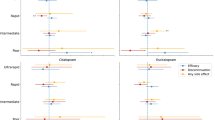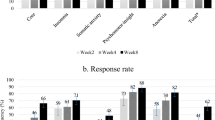Abstract
Large differences in clinical response to selective serotonin reuptake inhibitors (SSRIs) are observed in depressive patients with different genotypes. Quantification of these differences is needed to decide if genetic testing prior to antidepressant treatment is useful. We conducted a systematic review of the literature on the influence of polymorphisms in the serotonin transporter gene (SERTPR (or 5-HTTLPR) and STin2) on SSRI response. Studies were identified by the use of MEDLINE, EmBase and PsycINFO, references of articles, reviews and information from pharmaceutical companies. Nine studies assessing the influence of SERTPR or STin2 on treatment response were included. Outcome was expressed as the percentage of decrease in depression score (HAM-D or MADRS) or as the percentage of responders (≥50% reduction on the depression scale). Both study methodologies and study outcomes showed large heterogeneity. Weighted mean decreases in depression score for patients with the s/s, s/l and l/l genotypes were 35.4, 46.3 and 48.0% at week 4, respectively, and 53.9, 54.6 and 48.3% at week 6. Among Caucasian patients, both mean decrease in depression score and response rate were lowest in the s/s group, while among Asian patients, results were inconsistent. Weighted response rates were 36.1% for the 10/12 genotype of the STin2 polymorphism and 80.7% for the 12/12 genotype (χ2=27.8, P<0.001) (only Asians). The available evidence points to a less favourable response to SSRI treatment among Caucasian patients with the SERTPR s/s genotype and among (Asian) patients with the STin2 10/12 genotype. In view of the scarcity and heterogeneity of the studies, however, current information is insufficiently reliable as a basis for implementing genetic testing in the diagnostic work-up of the depressive patient.
This is a preview of subscription content, access via your institution
Access options
Subscribe to this journal
Receive 12 print issues and online access
$259.00 per year
only $21.58 per issue
Buy this article
- Purchase on Springer Link
- Instant access to full article PDF
Prices may be subject to local taxes which are calculated during checkout
Similar content being viewed by others
References
Lotrich FE, Pollock BG, Ferrell RE . Polymorphism of the serotonin transporter: implications for the use of selective serotonin reuptake inhibitors. Am J Pharmacogenom 2001; 1 (3): 153–164.
Middlemiss DN, Price GW, Watson JM . Serotonergic targets in depression. Curr Opin Pharmacol 2002; 2 (1): 18–22.
Lesch KP . Serotonergic gene expression and depression: implications for developing novel antidepressants. J Affect Disord 2001; 62 (1–2): 57–76.
Lesch KP . Variation of serotonergic gene expression: neurodevelopment and the complexity of response to psychopharmacologic drugs. Eur Neuropsychopharmacol 2001; 11 (6): 457–474.
Veenstra-VanderWeele J, Anderson G, Cook E . Pharmacogenetics and the serotonin system: initial studies and future directions. Eur Jo Pharmacol 2000; 410: 165–181.
Steimer W, Muller B, Leucht S, Kissling W . Pharmacogenetics: a new diagnostic tool in the management of antidepressive drug therapy. Clin Chim Acta 2001; 308: 33–41.
Mundo E, Walker M, Cate T, Macciardi F, Kennedy JL . The role of serotonin transporter protein gene in antidepressant-induced mania in bipolar disorder: preliminary findings. Arch Gen Psychiatry 2001; 58 (6): 539–544.
Serretti A, Zanardi R, Rossini D, Cusin C, Lilli R, Smeraldi E . Influence of tryptophan hydroxylase and serotonin transporter genes on fluvoxamine antidepressant activity. Mol Psychiatry 2001; 6 (5): 586–592.
Zanardi R, Seretti A, Rossini D, Franchini L, Cusin C, Lattuada E et al. Factors affecting fluvoxamine antidepressant activity: influence of pindolol and 5-HTTLPR in delusional and nondelusional depression. Biol Psychiatry 2001; 50: 323–330.
Minov C, Baghai TC, Schule C, Zwanzger P, Schwarz MJ, Zill P et al. Serotonin-2A-receptor and -transporter polymorphisms: lack of association in patients with major depression. Neurosci Lett 2001; 303 (2): 119–122.
Zanardi R, Benedetti F, Di Bella D, Catalano M, Smeraldi E . Efficacy of paroxetine in depression is influenced by a functional polymorphism within the promoter of the serotonin transporter gene. J Clin Psychopharmacol 2000; 20 (1): 105–107.
Yu YW, Tsai SJ, Chen TJ, Lin CH, Hong CJ et al. Association study of the serotonin transporter promoter polymorphism and symptomatology and antidepressant response in major depressive disorders. Mol Psychiatry 2002; 7 (10): 1115–1119.
Rausch JL, Johnson ME, Fei YJ, Li JQ, Shendarkar N, Mac Hobby H et al. Initial conditions of serotonin transporter kinetics and genotype: influence on ssri treatment trial outcome. Biol Psychiatry 2002; 51 (9): 723–732.
Yoshida K, Ito K, Sato K, Takahashi H, Kamata M, Higuchi H et al. Influence of the serotonin transporter gene-linked polymorphic region on the antidepressant response to fluvoxamine in Japanese depressed patients. Prog Neuropsychopharmacol Biol Psychiatry 2002; 26 (2): 383–386.
Pollock BG, Ferrell RE, Mulsant BH, Mazumdar S, Miller M, Sweet RA et al. Allelic variation in the serotonin transporter promoter affects onset of paroxetine treatment response in late-life depression. Neuropsychopharmacology 2000; 23 (5): 587–590.
Smeraldi E, Zanardi R, Benedetti F, Di Bella D, Perez J, Catalano M . Polymorphism within the promoter of the serotonin transporter gene and antidepressant efficacy of fluvoxamine. Mol Psychiatry 1998; 3 (6): 508–511.
Kim DK, Lim SW, Lee S, Sohn SE, Kim S, Hahn CG et al. Serotonin transporter gene polymorphism and antidepressant response. Neuroreport 2000; 11 (1): 215–219.
Ito K, Yoshida K, Sato K, Takahashi H, Kamata M, Higuchi H et al. A variable number of tandem repeats in the serotonin transporter gene does not affect the antidepressant response to fluvoxamine. Psychiatry Res 2002; 111 (2–3): 235.
Hooijer C, Zitman FG, Griez E, van Tilburg W, Willemse A, Dinkgreve MA . The Hamilton Depression Rating Scale (HDRS); changes in scores as a function of training and version used. J Affect Disord 1991; 22 (1–2): 21–29.
Stimpson N, Agrawal N, Lewis G . Randomised controlled trials investigating pharmacological and psychological interventions for treatment-refractory depression. Systematic review. Br J Psychiatry 2002; 181: 284–294.
Author information
Authors and Affiliations
Corresponding author
Rights and permissions
About this article
Cite this article
Smits, K., Smits, L., Schouten, J. et al. Influence of SERTPR and STin2 in the serotonin transporter gene on the effect of selective serotonin reuptake inhibitors in depression: a systematic review. Mol Psychiatry 9, 433–441 (2004). https://doi.org/10.1038/sj.mp.4001488
Received:
Revised:
Accepted:
Published:
Issue Date:
DOI: https://doi.org/10.1038/sj.mp.4001488
Keywords
This article is cited by
-
Association between functional polymorphisms in serotonin transporter gene (SLC6A4) and escitalopram treatment response in depressive patients in a South Indian population
European Journal of Clinical Pharmacology (2020)
-
Effects of paroxetine on intravaginal ejaculatory latency time in Egyptian patients with lifelong premature ejaculation as a function of serotonin transporter polymorphism
International Journal of Impotence Research (2017)
-
Association of the serotonin transporter-linked polymorphic region genotype with lower bone mineral density
Translational Psychiatry (2017)
-
Effects of Central Nervous System Drugs on Recovery After Stroke: A Systematic Review and Meta-Analysis of Randomized Controlled Trials
Clinical Drug Investigation (2017)
-
Douleur chronique : rôle de la pharmacogénétique dans la résistance aux antidépresseurs
Douleur et Analgésie (2013)



